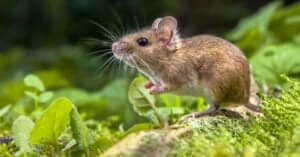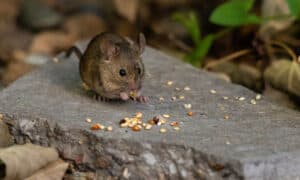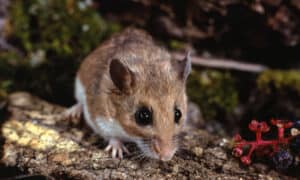- You will also have to purchase a hutch and bedding, with the latter having to be replaced at intervals.
- You will also need to consider the costs of different types of food as well as healthcare.
Guinea pigs are adorable and popular pets, beloved for their social behavior toward humans. They are also often seen as an easier and more affordable pet than the traditional cat or dog option due to their small size. How much are guinea pigs likely to cost? There are many factors that first-time owners need to take into account when acquiring one of these little rodents.
Guinea pigs cost more than just the adoption fee or purchase price. Getting a new pet is about making an investment in its life. Its cage, food, bedding, and health are all regular expenses you need to know about in order to gauge the annual cost of a guinea pig.
Other issues like their sociability and activity levels also factor into a guinea pig’s cost. As herd animals, guinea pigs live happier and more fulfilled lives when they are kept in groups of two or more. This obviously doubles or triples the amount you can expect to pay on recurring expenses like food and bedding. Guinea pigs also tend to be healthier when they have larger living spaces, so how much you want to invest in their cage and play areas also impacts your overall costs.
How Much Are Guinea Pigs on Average?
The adoption fee or purchase price is not the only upfront cost you have to pay. That alone can be anywhere from $10 to over $100. It is usually $10 to $40 from an animal shelter and $25 to $50 from a breeder. If you are helping to rehome a guinea pig, you could get it for free.
That said, a guinea pig’s price can climb up pretty quickly once you take additional factors into account.
Initial costs total anywhere from $100 to $500 with an average of around $150, which includes the supplies such as the hutch, bedding, food and water dispensers, food, and optional items such as toys:
- Cage or hutch: $50-500
- Food bowls: $10
- Water bottle: $10
- Hay rack: $20
- Hideaway: $25
- Bedding: $10
- Guinea pig pellets: $15
- Grass hay: $10
- Fresh vegetables: $5
- Vitamin C supplement: $7
After that, it’s about the ongoing costs of taking care of your guinea pig. An annual cost gives a good estimate of the cost per year you spend on your guinea pig.
On the other hand, there are also different breeds of guinea pigs to consider. In the USA there are 13 main recognized breeds, while the British Cavy Council recognizes 50. Regardless, here are the adoption costs of some of the more expensive breeds:
- Alpaca, long-haired, and the most attractive: $45
- Abyssinian, the friendliest: $50
- American, a popular shorthaired breed: $25
- Peruvian, a long-haired breed: $40
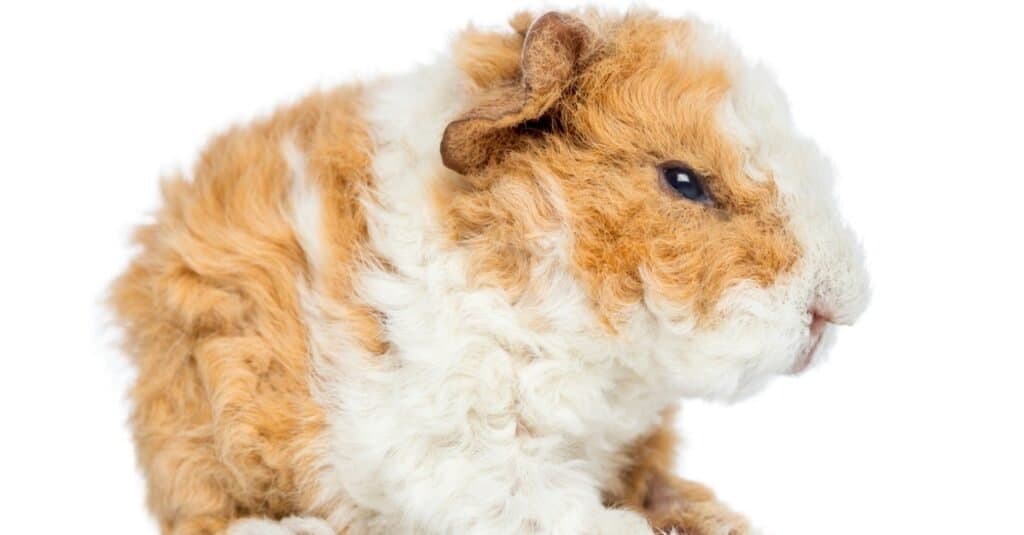
©Eric Isselee/Shutterstock.com
Guinea Pig Care Annual Cost
The annual cost of guinea pig care can be broken down into each specific expense after a monthly estimate. You can expect to pay about $70 a month to take care of your guinea pig, which will give you an idea of the cost per year minus additional guinea pigs, regular veterinarian visits, and any unique medical needs.
Overall, a guinea pig’s price per year is likely to fall between $100 and $500, with a higher-end cost of $200 to $1,000. The low end is $500, the high end is $800 and the average is $650, while food, bedding, and healthcare total an annual cost of at least $200. You can save money on supplies, for example, by purchasing bedding in bulk whenever possible, or purchasing secondhand hutches and other items.
Hutch maintenance and bedding
The hutch should measure at least 10.5 square feet to house two guinea pigs. It should have a sheltered area the guinea pig(s) can hide in to feel safe or sleep. You can expect an annual cost of $50 to $200 for hutch maintenance and bedding, while bedding alone has a cost per year of $50 to $100 with straw or other bedding costing up to $10 a month.
Grooming
Guinea pigs don’t generally need a bath unless they are dirty. Short-haired guinea pigs need a good brushing and once-over weekly, while long-haired guinea pigs need daily brushing. A slicker brush, the same as the kind used on dogs, is best for brushing long-haired guinea pigs such as the Peruvian or the Sheba — just get the size for smaller animals. Alternately, you can trim the fur of a long-haired guinea pig to make it easier to manage.
Your guinea pig will also need nail trimming, so you’ll have to buy a nail trimmer for rabbits or small animals. For the cost of a slicker brush and a nail trimmer, you will be making a one-time purchase that will probably only count for the first year. A slicker brush usually costs $8 to $10, while a nail trimmer costs $4 to $14 for a total of $12 to $24.
Food
The annual cost of food for your guinea pig is between $100 to $500, with the following monthly average costs:
- Grass hay: $10
- Guinea pig pellets: $15
- Fresh vegetables: $5
- Vitamin C supplement: $7
Healthcare
There are many considerations with regards to healthcare for each guinea pig that affect their cost per year.
Your guinea pig will need annual checkups at the vet to ensure it remains in excellent health. As it advances in age, you will need to take it twice a year.
Your expenditure will ultimately be determined by the area you live in, and the vet in question.
Shelters may accept significantly lower costs enabling you to provide your pet with excellent care while spending less.
Signs your pet needs to be taken to the vet include a swollen mouth or drooling, sore feet, diarrhea, or a runny nose.
Healthcare can have an annual cost of $200 to $1,000. That includes:
- Checkups: $50-100
- Dental: $0-200
- Parasite treatment (deworming every 3 months): $10-50
- Emergencies: $0-500
- (Optional) insurance: $50-200
- Any ongoing medical conditions: $0-100
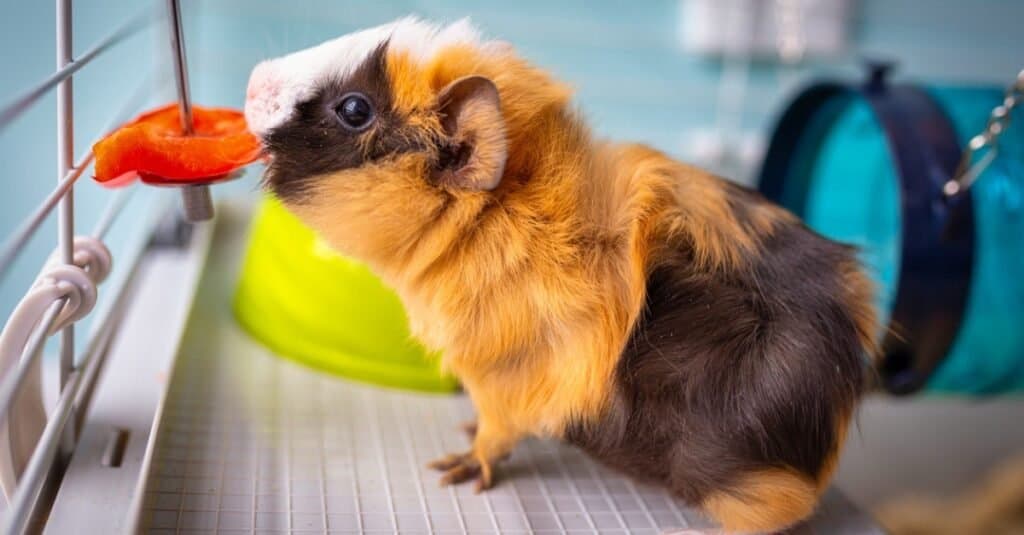
©Patryk Kosmider/Shutterstock.com
Optional items
Providing entertainment for your guinea pig is not always necessary, but highly desirable for their emotional health and stimulation. Toys and chews can have a cost per year of $0 to $100.
One Guinea Pig vs Two Guinea Pigs: What If You Double the Fun?
One should also consider the possibility of adopting two or more guinea pigs instead of one. Guinea pigs are social with humans but also need interaction with their own kind. Although maintenance costs will increase, guinea pig owners can expect to have happier, healthier pets when they give them at least one companion, which allows them to decrease stress. The emotional well-being of your guinea pig will factor into your annual cost of taking care of it and can make the difference between a much higher cost per year with one guinea pig or a moderately higher cost per year with two.
The guinea pig is a social pet that is relatively low-cost to purchase and maintain. However, an investment in two guinea pigs is a wise choice for ensuring it gets the interaction. The number of guinea pigs, the breed, where you purchase it, and optional items factor into the initial cost as well as the annual cost with regards to grooming, medical needs, food, and other expenses.
Up Next…
Keep reading these posts for more incredible information about key animal facts.
- How Much Does It Cost to Board a Horse? Just how deep will you have to dig into your coffers to keep your equine pet well-sheltered, fed, and groomed? Take a look at all the pertinent factors, here.
- How Much Does a Rabies Shot for a Dog Cost? It’s absolutely essential for every animal you keep that might be a carrier. Here’s all you need to know about providing that potentially life-saving treatment.
- The Costs and the Benefits of Microchipping Your Dog: Why should you consider letting your pet undergo this procedure? Just how expensive is it? The answers to both questions are provided right here.
The photo featured at the top of this post is © Lillac/Shutterstock.com
Thank you for reading! Have some feedback for us? Contact the AZ Animals editorial team.




